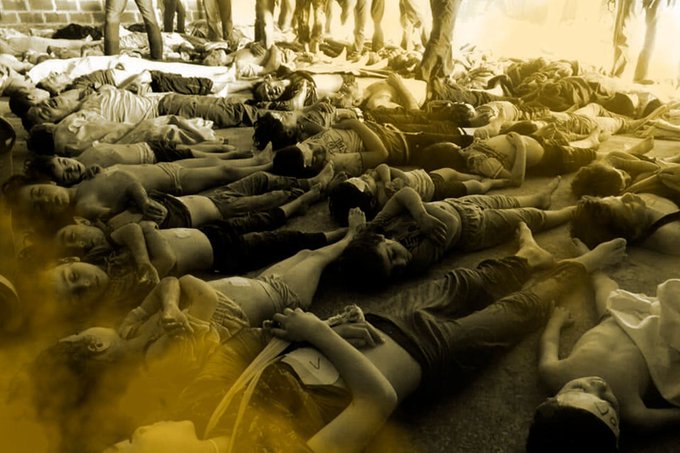Sunday marks nine years since the Ghouta massacre, in which the Syrian regime used Sarin gas in the suburbs of Damascus, killing over 1,000 civilians in the first major chemical incident of the Syrian civil war.
In the early hours of the morning on 21 August 2013, at least 12 rockets carrying the deadly gas fired by Assad’s army began to land in the heavily populated civilian town of Ghouta.
Around 1,500 people lost their lives - a great many of them children, who suffocated in the poisonous fumes which spread silently throughout the town.
Today, Ghouta is in the hands of The Syrian regime.
And as Syrians mark the ninth anniversary of the massacre, many Arab states have been making increasingly clear that they intend to normalise relationships with the Assad regime.

Silence vs. accountability
The head of Syria’s opposition coalition Salem al-Maslat said today that “the international community has not achieved any tangible accountability, despite international investigations proving the Assad regime’s responsibility for the chemical attacks.”
“The children's last breaths fell on the deaf ears of this world’s decision makers, who have allowed this criminal regime to continue its rule over Syria,” said al-Maslat.
He described the Syrian regime - along with its Iranian and Russian backers - as “bloodthirsty criminals who employ murder, terrorism, detention and disappearance” to stay in power.
“The misguided belief that this government could change is a waste of time, as we can see in the crimes of its supporters in Ukraine,” al-Maslat continued.
The green light
The Syrian regime still denies any responsibility for the massacre in Ghouta nine years ago. Government sources and pro-Assad media regularly suggested the attack was a “false-flag” operation.
However, international intelligence gatherers were clear that the chemicals used in the attack were from government stockpiles, and could not have been deployed by the opposition.
Furthermore, Human Rights Watch declared at the time that they had “proof that the Assad regime was behind the attacks".
The UN response was limited to the security council’s resolution 2118, which attempted to disarm the regime without holding it directly responsible for the attacks in Ghouta.
And after the massacre, the regime went on to use Sarin gas across Syria in well-documented attacks, such as the massacre at Khan Sheikhoun in April 2017 and the Al-Latiminah attack in March 2017.
“The international silence when Ghouta was attacked gave the regime carte blanche to commit other barbarous acts,” said Mahmoud al-Najjar, head of the Syndicate of Free Syrian Lawyers.
“International attempts to hold this terrorist regime accountable are either forgotten or ignored by the UN security council,” he hit out, speaking to Arabi21 on the anniversary of the Ghouta massacre.
Assad’s return to the fold
Despite the many massacres, well-documented war crimes and repression of the Syrian people, some states in the Middle East are weighing up their options and considering a return to open relations with the Assad regime.
Earlier this year, Algeria and Egypt pushed for Syria’s membership of the Arab League to be unfrozen.
Syria was frozen out in the cold at the Arab League’s 2013 summit, just months before the massacre at Ghouta.
But Qatar and Saudi Arabia came out against the warming relationships with the Assad regime, effectively blocking the move.
Both Bahrain and the UAE have reopened embassies in Damascus in recent months, to the dismay of many opposition figures inside Syria.
According to data by the Syrian Network for Human Rights (SNHR) released this year, Assad’s regime and its backers are responsible for 91 percent of deaths since the start of Syria’s civil war in 2011.
And while governments in the Middle East and beyond decide whether to re-open relationships with the Assad regime, members of the Syrian opposition wonder whether those deaths are remembered at all.
The New Arab
















Comments About This Article
Please fill the fields below.